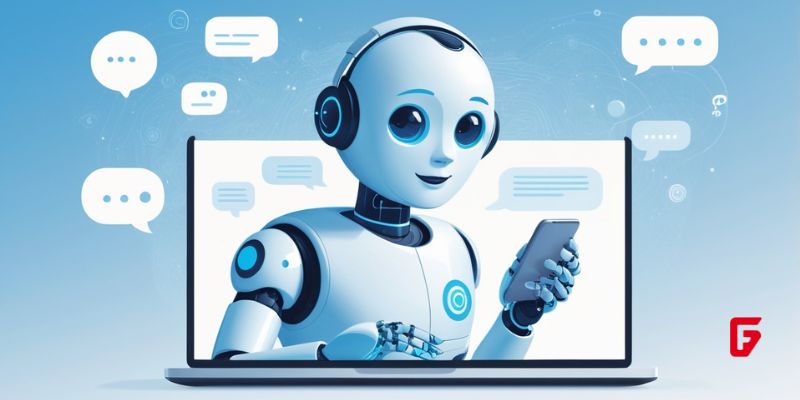Startups & Business News

Conversational AI customer service is changing the way businesses connect with people. This article breaks down how AI chatbots for support work, the benefits of conversational AI, and the future of customer experience AI. We’ll also cover the latest AI-powered customer service trends and what they mean for you.
Content
- What is Conversional AI?
- What are the main ways conversational AI is transforming customer service?
- How do AI chatbots improve support and customer experience?
- What are the key benefits and future trends of AI-powered customer service?
- 5 Trending Companies with a Conversational AI solution
Imagine reaching out for help and getting instant answers-no more waiting on hold, no more repeating your problem to different agents. That’s the promise of conversational AI customer service. The days of clunky menus and generic responses are fading fast, replaced by smart AI chatbots for support that understand what you need and respond in real time.
Why is this shift happening now? Customers expect fast, personal, and always-on support. Businesses want to deliver better service while working smarter, not harder. Enter conversational AI-a technology that bridges these goals. With AI chatbots for support, companies can handle routine questions, solve problems around the clock, and free up human agents for the trickier issues.
But it doesn’t stop at quick replies. The real benefits of conversational AI are about creating smoother, more human-like conversations that build trust and loyalty. These systems learn from every interaction, getting better at predicting what customers want and how to help. The result? Happier customers, more efficient teams, and a stronger bottom line.
Looking ahead, the future of customer experience AI is bright. We’re seeing AI-powered customer service trends like hyper-personalization, emotional intelligence, and seamless support across every channel-phone, chat, social, and more. Companies that embrace these trends will stand out, offering experiences that feel effortless and even a little magical.
Ready to see how conversational AI customer service is shaping the future? Let’s dive into the key benefits of conversational AI, explore the latest AI-powered customer service trends, and discover what’s next for AI chatbots for support.
What is Conversional AI?
Conversational AI is the technology behind the smart, interactive systems that power today’s digital customer support. At its core, it combines natural language processing (NLP), machine learning, and advanced algorithms to enable computers to understand, process, and respond to human language in a conversational way. This is the engine driving conversational AI customer service, making interactions faster, more accurate, and much more natural than the old-school automated menus or scripted responses.
Instead of forcing customers to navigate endless phone trees or wait for email replies, AI chatbots for support can answer questions, troubleshoot problems, and even complete transactions-all in real time. These chatbots are available 24/7, learn from every conversation, and get better at predicting what users need with each interaction. This not only improves efficiency but also personalizes the customer experience, which is one of the key benefits of conversational AI Gartner, IBM.
Looking at the future of customer experience AI, we’re seeing rapid adoption across industries. Businesses are using AI to handle everything from simple FAQs to complex problem-solving, freeing up human agents for more nuanced tasks. This shift is part of broader AI-powered customer service trends, including smarter virtual assistants, multilingual support, and seamless integration across chat, voice, and social channels Forrester.
In short, conversational AI customer service is about more than just chatbots-it’s about making every customer interaction smoother, smarter, and more human. As technology evolves, the line between human and machine support continues to blur, setting new standards for what great service looks like.
What are the main ways conversational AI is transforming customer service?
Conversational AI customer service is redefining how businesses interact with customers, delivering efficiency, personalization, and 24/7 support that traditional models struggle to match. Here’s how AI chatbots for support and conversational AI are reshaping the future of customer experience AI:
Instant, 24/7 Support: AI-powered chatbots provide round-the-clock assistance, enabling customers to get answers and resolve issues any time-no more waiting for business hours or long queues. This always-on availability meets rising consumer expectations for immediate service.
Cost Savings and Scalability: By automating up to 80% of routine queries, conversational AI reduces customer service costs by 40–70% and allows support teams to handle higher volumes without overstaffing. This scalability is crucial during peak times when demand spikes.
Hyper-Personalization: AI analyzes customer data and previous interactions to tailor responses, making each engagement feel unique and relevant. This level of personalization is a key trend in the future of customer experience AI and drives loyalty.
Efficient Troubleshooting and Account Management: Conversational AI can guide customers through complex troubleshooting steps, manage account changes, and authenticate users securely-all through natural language, minimizing friction and human intervention.
Multilingual and Inclusive Support: AI chatbots for support can converse in multiple languages, breaking down barriers for global customers and ensuring services are accessible to everyone.
Proactive and Predictive Service: Leveraging predictive analytics, conversational AI can anticipate customer needs-like reminding about upcoming deadlines or flagging potential issues-creating a proactive support environment that feels genuinely attentive.
Actionable Insights: Every interaction with conversational AI generates valuable data, helping businesses uncover trends, customer pain points, and opportunities for improvement-fueling smarter strategies and better service.
The benefits of conversational AI are clear: faster resolutions, lower costs, improved customer satisfaction, and a seamless, personalized experience that sets the standard for AI-powered customer service trends in 2025 and beyond.
How do AI chatbots improve support and customer experience?
Conversational AI customer service is transforming the way businesses interact with customers by handling up to 95% of all customer interactions by 2025, both in voice and text, leading to faster, more consistent support. The adoption of AI chatbots for support allows companies to offer 24/7 assistance, automate routine queries, and resolve issues up to 87% faster, which not only boosts customer satisfaction but also frees human agents to focus on complex problems.
The benefits of conversational AI include operational cost reductions of up to 30%, a significant decrease in wait times, and increased agent productivity-support teams using AI tools can manage more inquiries per hour and resolve issues more efficiently. Customers increasingly prefer instant, automated help, with 51% choosing chatbots over human agents for immediate answers.
Looking at the future of customer experience AI, trends show that AI-powered solutions will continue to personalize interactions, reduce operational costs, and drive higher customer loyalty as businesses invest more in advanced chatbot capabilities. As AI-powered customer service trends evolve, expect smarter, more empathetic bots that seamlessly blend automation with human-like understanding, setting new standards for customer experience.
What are the key benefits and future trends of AI-powered customer service?
Conversational AI customer service is rapidly redefining how brands interact with customers, offering tangible improvements in efficiency, personalization, and satisfaction. The primary benefits of conversational AI include:
24/7 availability and instant responses, meeting rising consumer demand for immediate support.
Significant cost savings, with companies reporting millions saved by automating routine queries through AI chatbots for support.
Enhanced agent productivity, as AI handles up to 80% of repetitive tasks, allowing humans to focus on complex issues.
Consistent, accurate information delivery, reducing errors and boosting customer trust.
Deep insights via AI-powered conversation summaries, sentiment analysis, and intent categorization, helping businesses refine service strategies and training.
Looking ahead, the future of customer experience AI is shaped by several trends:
By 2025, AI is projected to handle up to 95% of all customer interactions, with widespread adoption of generative AI and advanced chatbots.
The rise of empathetic AI, capable of detecting customer emotions and dynamically adjusting responses, will drive more personalized and human-like experiences.
AI-powered customer service trends point to seamless handoffs between bots and humans, proactive issue resolution, and omnichannel integration, ensuring customers feel heard and valued across every touchpoint.
The global conversational AI market is set for exponential growth, reflecting its central role in the future of customer service.
In summary, the benefits of conversational AI-from operational efficiency to improved customer satisfaction-are fueling its adoption, while ongoing advances in empathy, automation, and analytics are shaping the next era of customer experience.
5 Trending Companies with a Conversational AI solution
The landscape of conversational AI customer service is evolving at an incredible pace, reshaping the way brands interact with their customers. With AI chatbots for support handling everything from simple FAQs to more nuanced conversations, businesses are seeing a shift toward faster, more reliable, and always-available assistance. This shift is a clear signal that the future of customer experience AI is all about blending intelligent automation with a human touch.
Keeping an eye on AI-powered customer service trends is essential for any organization that wants to remain relevant. As these tools become more sophisticated, they offer deeper personalization, smarter routing, and the ability to predict customer needs before they’re even voiced. The benefits of conversational AI-including increased efficiency, cost savings, and improved satisfaction-are becoming too significant for any forward-thinking business to ignore.
If you haven’t already, now is the time to consider how conversational AI can transform your support strategy. Stay curious, keep experimenting, and position your business at the forefront of customer service innovation.

futureTEKnow
Editorial Team
futureTEKnow is a leading source for Technology, Startups, and Business News, spotlighting the most innovative companies and breakthrough trends in emerging tech sectors like Artificial Intelligence (AI), Robotics, and the Space Industry.
Discover the companies and startups shaping tomorrow — explore the future of technology today.
Most Popular
Trending Companies
Latest Articles

Dwelly Raises $93M to Supercharge AI-Powered UK Rentals Roll-Up
London startup Dwelly just landed $93M to snap up UK rental agencies and inject AI smarts. Founders from Uber and

Encord Raises $60M Series C: Fueling Physical AI Data Wave
Encord just landed $60M in Series C funding to supercharge data tools for physical AI. Founders Eric Landau and Ulrik

Foodforecast Raises €8M Series A to Slash Ultra-Fresh Food Waste with AI
Foodforecast, a Cologne AI foodtech firm, just scored €8M in Series A funding led by SHIFT Invest. Their tools predict

AI-Driven Operational Excellence: How Leaders Scale Ownership, Discipline, and Continuous Improvement in 2026
In 2026, AI scales operational excellence fundamentals—clear ownership, disciplined execution, and continuous improvement—letting leaders focus on outcomes while systems handle

VoiceLine raises €10M to scale voice AI for enterprise frontline teams
Munich-based VoiceLine has closed a €10M Series A round to grow its voice AI platform for frontline sales and service

AI-Driven Logistics & Distribution Transformation: From Insight to Scalable Impact
AI is redefining logistics transformation—from network design to real-time execution. This article explores how data-driven insight, intelligent automation, and scalable

Hai Robotics Hong Kong IPO: From Startup Funding to Warehouse Robot Leader
Shenzhen’s Hai Robotics, pioneer in ACR warehouse robots, files for HK IPO after raising over $500M in funding rounds led

AI-Enabled Process Engineering & Continuous Improvement: Designing Systems That Learn
Explore how AI transforms process engineering and continuous improvement into self-learning systems. This article explains how organizations can design operations

Ouster Acquires StereoLabs: Unified Physical AI Sensing Platform Launches
Ouster’s $35M StereoLabs acquisition fuses lidar and ZED cameras into end-to-end Physical AI sensing. Founders Cecile Schmollgruber and team drive

Bretton AI Lands $75M Series B Funding to Scale AI Agents for Financial Crime and AML/KYC Compliance
Bretton AI’s $75M Series B modernizes AML KYC compliance via AI agents, slashing staffing costs for banks and fintechs like

Axiom Space Raises $350M to Build Commercial Space Station and NASA Spacesuits
Axiom Space has locked in a fresh $350M raise to push its commercial space station and NASA lunar spacesuits toward

Santé Raises $7.6M Seed: AI Fintech Revolution for Wine and Liquor Retail
New York startup Santé secures $7.6M seed to build AI-powered POS for liquor stores, tackling regs & inventory woes after
futureTEKnow is focused on identifying and promoting creators, disruptors and innovators, and serving as a vital resource for those interested in the latest advancements in technology.
© 2026 All Rights Reserved.
![Discover the top 10 AI companies in Germany [1st Edition], revolutionizing industries with cutting-edge technology and innovations.](https://futureteknow.com/wp-content/uploads/2025/02/Top-10-AI-Companies-in-Germany-Leading-the-Tech-Revolution-futureTEKnow.jpg)







